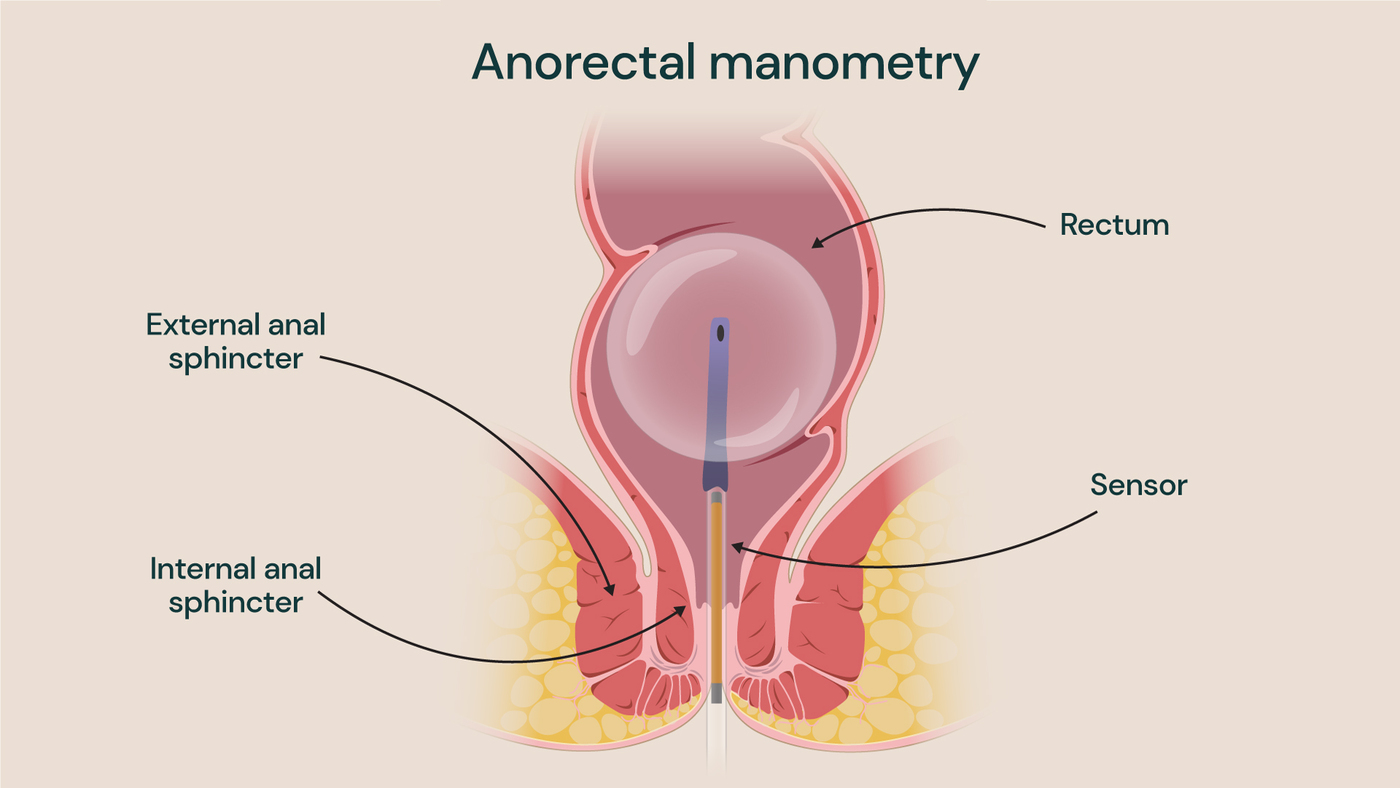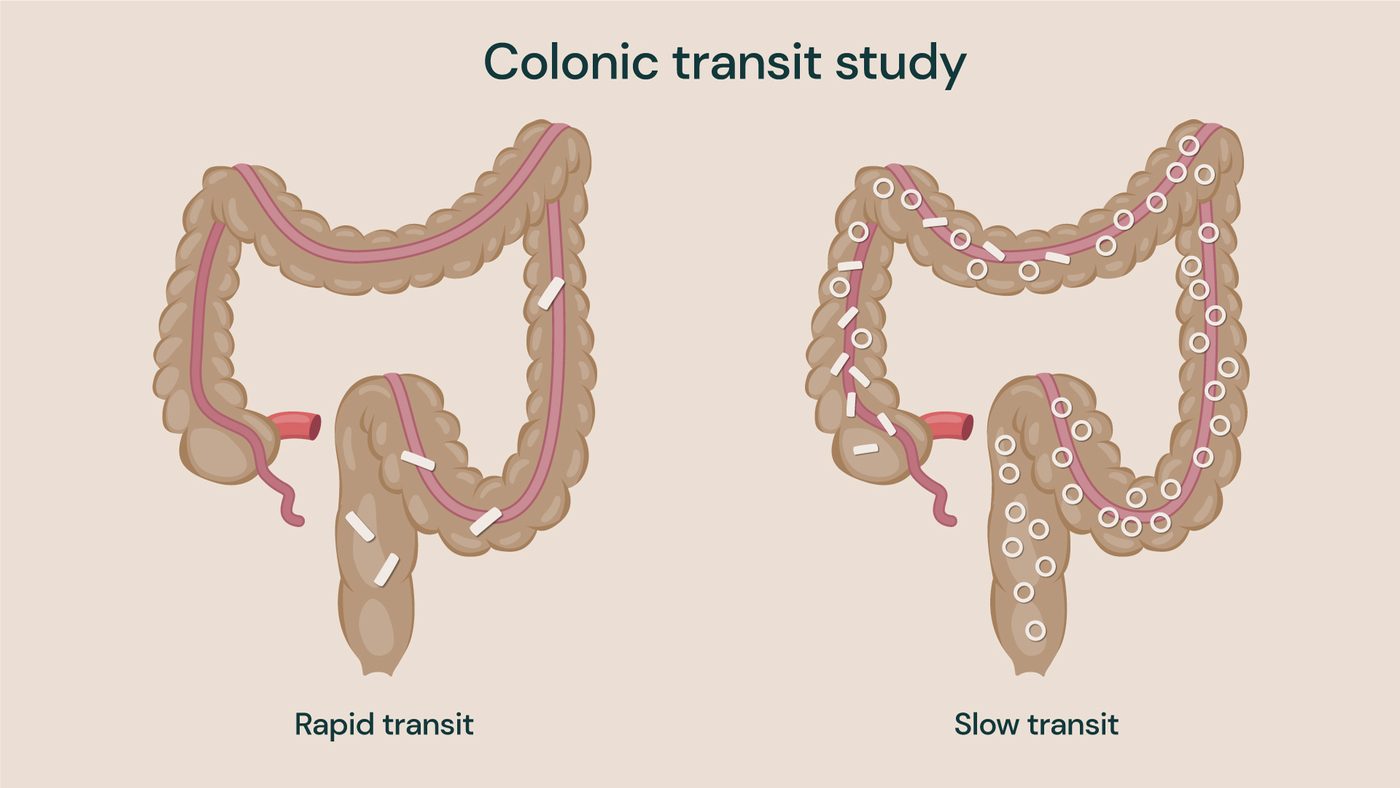What is an anorectal manometry, an endosonography and a colonic transit study?
At Evelina London Children’s Hospital, we are one of a small number of UK centres offering a whole package of investigations for children with colorectal disorders. Our one-stop service, designed to establish the cause of constipation and/or faecal incontinence includes:
- 3D high resolution anorectal manometry (assessing muscle and nerve activity and function in the digestive system)
- endosonography (assessing structure of anal sphincters using an ultrasound scan with a thin probe inserted via the rectum)
- colonic transit study (assessing how quickly food passes through the digestive system)
By performing all 3 of these tests in a one-stop admission, our specialists can see the entire picture of your child’s colonic health, enabling us to offer appropriate, timely treatment.
Who is anorectal manometry for?
Anorectal manometry may be recommended for children living with chronic constipation or faecal incontinence, primarily as a method to establish the cause of their issues so that appropriate treatment can be recommended.
Our one-stop service includes anorectal manometry, endosonography and a colonic transit study. It’s recommended for children who have failed to be treated adequately for their constipation and soiling by medical means before coming to us, and who have seen paediatricians and gastroenterologists first.
Hirschsprung’s disease affects 1 in 5,000 children. It’s a condition that causes poo to become stuck in the lower large intestine and rectum, which go into spasm and do not relax. The condition is mainly diagnosed in babies and very young children. Your bowel normally works by continuously squeezing and relaxing to push poo along, and this process is controlled by the nerves in your large intestine.
However, children who don’t have physical issues, but still have problems affecting their pooing habits, are likely living with psychological challenges leading to fear passing stools due to pain, resulting in withholding behaviours. However, this cannot be determined without investigations, which is where anorectal and colonic investigations are used, to establish whether physical treatment or psychological support is required to resolve the issues.
What does an anorectal manometry, endosonography and colonic transit show?
The 3 different investigations (anorectal manometry, endosonography, and colonic transit study) are used to show various elements about activity within the large intestine, rectum and anal sphincter muscles.
Anal manometry and endosonography are performed at the same time while your child is sedated with general anaesthetic, while the colonic transit study is started a week before the other investigations.
Anorectal manometry
Anorectal manometry is where a balloon on the end of a thin tube is passed into the rectum (the last part of the large bowel) through the anus. This measures the ability of the muscles to squeeze and tests whether the nerves inside the bowel are working properly to relax the anus when a stool if ready to pass. This test also helps us to assess the size of the rectum.
The manometry provides functional information about how the lower part of your child’s bowel is working. This includes information about their sphincter and reflexes, and avoids the need for biopsies of the rectum, which can carry a risk of infection, bleeding and inadequate biopsy. The manometry uses a balloon on the end of a catheter (a very thin and flexible tube) inserted into the rectum, and air is puffed into the balloon to assess your child’s reflexes and strength of the anal sphincter muscles.

Anal endosonography
Anal endosonography is a type of ultrasound scan that checks the shape and size of the muscles around the anus that is performed under the same anaesthetic. The endosonography shows the structural morphology of the lower part of your child’s rectum and sphincters to ensure that they are intact. Any structural issues that could be causing a blockage or problems leading to faecal incontinence will be highlighted by the endosonography (see figure 2).
Colonic transit study
The colonic transit study assesses the passage of stool in the large intestine. It begins in the week before the anorectal manometry and endosonography procedures, and it involves giving your child 3 different capsules to swallow. Each of these capsules contains 10 pellets, with different shaped pellets within each capsule (a different shape for every day). Your child will take a capsule each day for 3 consecutive days, and then nothing on the fourth day, before an X-ray of the abdomen is taken on the fifth day.
The X-ray shows how many pellets remain in the digestive system, and how many have been excreted from the large intestine and the rectum. This provides accurate information about exactly how long it takes for your child to pass poo, highlighting whether there are problems with a large sized rectum and colon, therefore informing their future treatment options.

How to prepare for anorectal and colonic investigations
Before visiting us for your child’s anorectal manometry appointment, you will have received instructions on how to prepare, including any relevant fasting requirements. Your child should stop taking any medication that they normally take during the study, unless advised otherwise by our specialists.
Your child may also require an enema (liquid medicine to clear their rectum of poo) beforehand, which will be performed in our Children’s Day Surgery Unit at Evelina London prior to the anorectal manometry.
If you have any questions about what to expect at your child’s appointment which have not been answered in the days leading up to it, or by the information given in advance, please do not hesitate to contact your child’s specialist for guidance.
How is anorectal manometry and anal endosonography performed?
Anorectal manometry and anal endosonography are performed while your child is fully sedated under general anaesthetic. This is both for their comfort and to ensure that the investigations can be carried out safely with no movement from your child.
Anorectal manometry
When your child is under anaesthetic, a catheter with a deflated balloon on the end is inserted into your child’s bottom, while the other end of the catheter is attached to a machine. Air is puffed into the balloon to look for reflexes of contraction and relaxation of anal sphincters, and to see how strong the muscles around your child’s back passage are.
The balloon mimics poo as the muscle in the rectum should respond to expansion and attempt to squeeze and move the poo down to help it pass. By inserting the balloon, the machine will show readings of any pressure inside your child’s rectum, providing information to our specialists about how well the nerves and muscles work. If there is doubt about presence of normal rectal anal inhibitory reflexes (RAIR), a rectal biopsy is taken to exclude Hirschsprung’s disease.
Anal endosonography
After the anal manometry readings have been taken, an anal endosonography scan is performed. This is an internal scan using a very thin ultrasound probe (approximately the size of a thumb) inserted into your child’s bottom. This scan will show the structural morphology of your child’s lower rectum and anal sphincters, highlighting any abnormalities or damage that are causing their constipation or faecal incontinence.
Colonic transit study completion
Our specialists also investigate where the pellets from the daily capsules are, and how many remain in the colon. This forms the third part of the investigations, providing further functional information.
How long do the anorectal and colonic investigations take to carry out?
The length of our one-stop service including anorectal manometry, endosonography and colonic transit study varies depending on exactly which combination of investigative tests your child requires.
Anorectal manometry and anal endosonography are performed at the same time while your child is sedated with general anaesthetic. The investigations usually take approximately 90 minutes, but can take up to 2 hours in other children who require further procedures, including rectal biopsy and botulinum toxin treatment.
You should prepare to be in Evelina London’s Children’s Day Surgery Unit for up to 6 hours, which also includes 3 hours for your child to recover from the anaesthetic before returning home.
A colonic transit study takes 5 days to complete and you will need to visit hospital twice with your child – on day 1 of the study to be provided with the capsules and start the study and again on day 5 to get an X-ray and complete the study.
Are there any side effects of anorectal manometry and endosonography?
There is a very small risk of injury to your child’s rectum due to the insertion of the manometry catheter and the endosonography probe in the procedure or rectal biopsy if required. However, the chance of this occurring is very low, and our specialist consultants take every precaution to prevent this from happening.
Your child may also experience some nausea, as well as irritation in the rectum, but these effects should pass quickly and not cause too much discomfort. You and your child should be able to return home and resume normal daily activities after the anorectal investigations are complete.
Results
Our specialist team will inform you with the results of your child’s anorectal manometry, endosonography and colonic transit study on the same day they are completed. The results of the tests will inform future treatment options for your child, whether that’s psychological support, medication, or surgery.
Guided by above investigations and if required, our surgeons will inject botulinum toxin into the external anal sphincter while your child is sedated. This is effective in treating chronic functional constipation in children who have not responded to conventional treatments. It was developed by Mr Alireza Keshtgar, consultant paediatric colorectal and neonatal surgeon at Evelina London, Guy’s and St Thomas’ hospitals.
Pricing
The price for our colorectal procedures service is case dependent and varies according to each child’s needs. Our specialists will provide further information on the recommended package once they have examined your child and established which tests are required.
Contact our team for further information.
Our children's gastrointestinal specialists
Our paediatric specialists treat young patients with a wide range of gastrointestinal issues. Discover more about their expertise and the treatments they offer.
